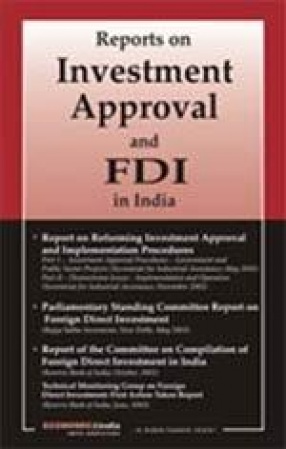Reports on Investment Approval and FDI in India
Synopsis
Oreign Direct Investment (FDI) today is seen as an instrument to facilitate and support domestic investment for achieving a higher Flevel of economic development, since it benefits both the domestic industry as well as the consumer, by providing opportunities for technological upgradation, access to global managerial skills and practices, optimal utilisation of human and natural resources, making industry internationally competitive, opening up export markets, providing backward and forward linkages and access to international quality goods and services. In the wake of current era of globalisation a transnational economic regime has emerged. With the establishment of a global economic order in the form of World Trade Organisation (WTO), the nations of the world have moved towards integrating their economies. The economic activities in any country need substantial investments and the FDI tends to bridge the investment-saving gap to achieve sustained growth. Besides the long-term additional capital that it brings in, FDI also tends to facilitate upgradation and transfer of technology and introduction of modern production and management practices. It has been observed that liberalization of the economic policy and changes in the structure of the economy has not translated fully into attracting greater investments due to a variety of reasons. Existing procedures of project formulation, appraisal & approval particularly for government projects, inadequacies in the existing management system and inadequate skills in project formulation, appraisal and management are some of the major reasons behind delays in the investment approvals and implementation of projects. Various studies have shown that complexities in the approvals required for primary resources like land, power, etc., multiplicity of approvals, disproportionate level of details sought with applications are among the major difficulties in the implementation of projects. Many approvals also do not seem to serve any public interest. Recent studies have shown that, while handling of approvals at Central level has registered a marked improvement, state level handling of approvals and reducing ground level hassles have emerged as important issues. There is also a need to align the FDI reporting system with the international reporting practices so as to facilitate proper international comparisons in respect of FDI flows. This publication brings together the following important reports relating to reforming investment approval and procedures and Foreign Direct Investment: Report on Reforming Investment Approval and Implementation Procedures Part I: Investment Approval Procedures – Government and Public Sector Projects (Secretariat for Industrial Assistance; May 2002) Part II: Downstream Issues – Implementation and Operation (Secretariat for Industrial Assistance; November 2002) Parliamentary Standing Committee Report on Foreign Direct Investment (Rajya Sabha Secretariat, New Delhi, May 2003) Report of the Committee on Compilation of Foreign Direct Investment in India (Reserve Bank of India; October, 2002) Technical Monitoring Group on Foreign Direct Investment: First Action Taken Report (Reserve Bank of India; June, 2003) We hope all these relevant reports put together will prove handy and useful to the readers interested in the subject.
Read more
31.50
28.35
$
35.00 $
Free delivery Wolrdwidе in 10-18 days
Ships in 1-2 days from New Delhi
Membership for 1 Year $35.00
Get it now and save 10%
Get it now and save 10%
BECOME A MEMBER










Bibliographic information